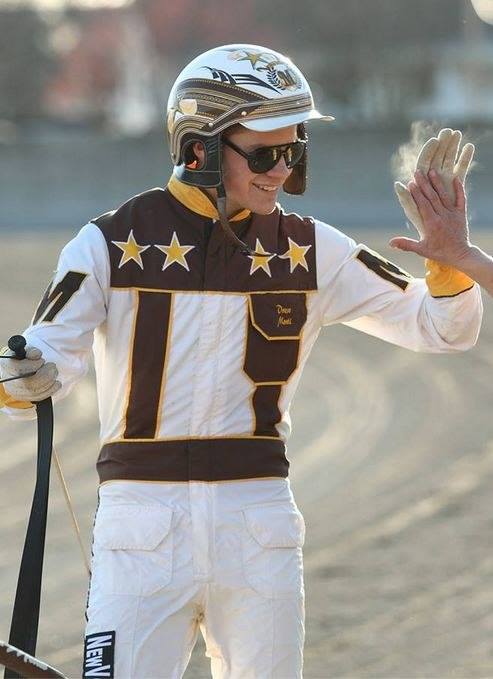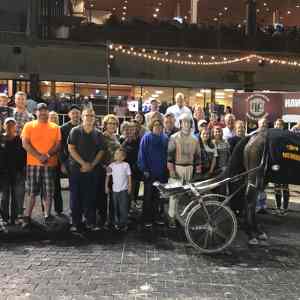A conversation with Drew Monti
by Ken Weingartner

Steve Roth photo.
Drew Monti has enjoyed a season to remember, and it’s not finished yet.
Among the 22-year-old driver’s accomplishments so far are: graduating from college, winning a New York Sire Stakes race for the first time, and posting seven victories on a single card. He also is in the hunt for the driving title at Batavia Downs, where he trails Jim Morrill Jr. by 12 wins with eight more dates on the schedule.
Following the conclusion of Batavia’s meet on Dec. 17, Monti might make a few trips to New Jersey to race at the Meadowlands before returning his focus to upstate New York and the start of a new meet at Buffalo Raceway. Monti finished fourth in this year’s standings at Buffalo.
Monti, a Buffalo native, followed his father, Darrin, and grandfather, Carl, into harness racing. He began driving regularly in 2013 and has won 673 races in his career, including 202 this year. In 2015, Monti established career highs of 224 victories and $1.16 million in purses, but could surpass both totals this season. He needs less than $8,000 to establish a new best for earnings.
In May, Monti graduated from Canisius College with an economics degree. In addition to driving, he also does some work for a financial advising firm.
Monti recently took time to talk to Ken Weingartner from the U.S. Trotting Association’s Harness Racing Communications division about his career.
KW: It’s been an exciting year for you in many different ways.
DM: Yeah, absolutely. There are a lot of things to look back on. I had a good year last year, but I think this is my best year so far. I won a (New York) sire stakes this year, and I’d never done that before. That was exciting. I’m second in the standings at Batavia. It’s still tight. I’m a few behind (Jim Morrill Jr.) but we’ll see. Hopefully I can get there. That would be awesome if I could be leading driver here. And I won seven races (on a card) this year (on Oct. 26 at Batavia). That was a personal high. I’d won five a couple times, but never more than that.
KW: I was going to bring that up. You won seven out of 10, right? What was that like? Is it a different feeling when you’re going through a night like that?
DM: Not really. I’ll tell you, though, what is different — it feels like the night goes right by. When you don’t do any good, it feels like the night drags on forever.
KW: Did you expect a big night?
DM: I thought it was going to be a good card. I had some good posts and I had some horses that I’d been driving that were down in class and drew inside and were sharp. I didn’t really say anything to anybody; I never want to talk like that out loud. But I thought it could be a wicked good night. And it turned out like nothing could go wrong. I was getting breaks, getting good trips, horses that could beat me were coming up flat — it was just left and right that I was getting breaks all night. (Laughs.) That’s how you win seven.
KW: I’m sure there have been times when you’ve looked at a card and thought you could have a big night and maybe things didn’t go your way.
DM: Lots of times. That happens way more often. You think you can really do some good and you don’t do any good at all. But that’s the game.
KW: How old were you when you decided this is what you wanted to do?
DM: Probably 14 or 15. I started helping my dad regularly. My grandfather has been in it for all his life. I was just brought up in it and we’ve always had horses, at least a few. I started qualifying horses and we had some decent horses throughout the last few years and it kind of showed people I could do a little good. Then I got some chances and it took off from there. I’m just very grateful to everyone that’s given me a chance.
KW: What’s the most difficult thing when you’re starting out as a young driver?
DM: If you have any success, not to get ahead of yourself. It’s a marathon, not a sprint. And also don’t get down if you don’t do well. I still struggle with that now. It takes a toll on you mentally and you can’t allow that to affect how you drive. You’ve got to go out there clear-minded and do your job the best you can do it. You have to focus on the things you’re doing right.
KW: When you’re trying to make a name for yourself do you take losses harder because you feel they’re missed opportunities? But, as you said, you also don’t want to get too high when you have the success.
DM: Exactly. That’s the thing, you do well and you start thinking you should be doing well. And that should never be the case racing horses. There’s never any entitlement. You could do all your work, you could make all the right moves, and sometimes things just don’t line up right. Sometimes horses show up a little flat, sometimes other horses show up better. There are things that are out of your control. As hard as that is to accept, that’s how it is.
KW: How do you learn as you’re going through it?
DM: There are always different situations in races and you’re never going to do everything right. But you try to learn the kinds of horses you drive and adapt. You get better at that the more you drive. I just try to be really open-minded and listen to what the trainer has to say. I try not to have any preconceptions about the horse, or the trainer. I think you’ll be the most successful that way.
KW: Do you watch other drivers and learn that way?
DM: All the time. Morrill is right here at home. It’s really easy to watch him as he’s going by you. (Laughs.) I look up to Tony Morgan. I’m good friends with him and I watch him all the time. There are a lot of guys, really. If there is ever a race on, I’m not going to ignore it, it doesn’t matter where it is. You can always watch and try to think what you would do in certain situations. It’s always interesting, it doesn’t matter what race it is.
KW: Do you set goals for yourself?
DM: Not really numerical goals, like I want to win this many races or make this much money. But I’ll have goals like try to get all good trips, or try not to over-drive a horse, or try not to make a certain mistake again. Just little goals to try to improve.
KW: What’s been your biggest thrill so far?
DM: Winning the sire stakes, and I’ll tell you why. That’s something I’d never done and I haven’t had a lot of shots to do it. On top of that, Rick Dane trained the horse (Americanfirewater) and (his partner) Monica Banca was there with the horse. That horse was only (age) 2 and hadn’t had a win yet. I came off the track and she was in tears, happy. She said that was his first sire stakes win and I said it was my first sire stakes win, too, so I’m as happy as you are. She gave me the cooler and a hug and said she was so happy to be a part of it. I was like, please, thank you. I appreciate it more than anything. That was probably the coolest moment. It was awesome. That was meaningful.
KW: How difficult was it to drive and go to college?
DM: Very tough. I tried to schedule myself where I could go to the track. I usually went to school just in the morning, but I went every day because I couldn’t go a whole day. It was tough to manage my time. I’d come home from races and I’d be shot, but sometimes I had to study or finish a project. But I got through it and did pretty well. I can tell you, I’m glad it’s over. It was busy and taxing mentally. But it was fun.
KW: Has it made you better now?
DM: I think so. It was a situation where you had to be mature and make sacrifices, or you weren’t going to do it. I never got a chance to do a lot of extras (with friends) but that being said, I’ve been successful and made pretty good money racing. I have some things others don’t have the privilege to have, but I put work in to get them.
KW: When you were in high school did you play any sports?
DM: I played baseball all four years and I also bowled all four years.
KW: Oh really. Were you good?
DM: Yeah, my average was like a 210. If I ever get some time I’ll still throw a couple games. It’s just hard to find the time for it.
KW: How about baseball?
DM: I was pretty good. I pitched through high school. My junior year, we won the regional championship, it’s called the Georgetown Cup. That was a real big season for us.
KW: You’ll be wrapping up at Batavia in a couple weeks. Then what’s the plan?
DM: Buffalo opens Jan. 11 and obviously that’s home. I’m thinking of trying the Meadowlands when there’s nothing else going on. I’d have to have a lot of success to make it worth going to New Jersey every weekend. Tentatively, Buffalo is just the plan. But we’ll see what happens. I’m open to anything. I’ll probably go (to the Meadowlands) because I’ll be off, but as far as staying, we’ll have to see.
KW: What do you most enjoy about doing this?
DM: Honestly, one of the big reasons I even do it at all is because I can do it with my family. My grandfather, my father, and I are all at the barn every day. We get to spend time together. I get to spend a lot of time with my dad. Some people don’t get to do that with family. I think I’m lucky for that.

